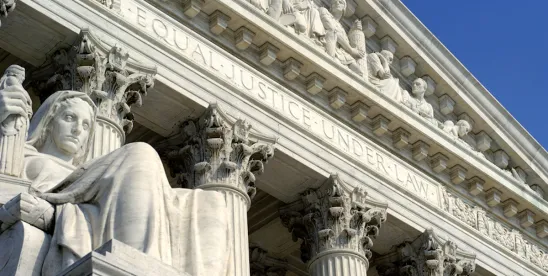On June 28, 2024, in Loper Bright Enterprises v. Secretary of Commerce, the Supreme Court of the United States ruled to overturn its four-decade-old decision in Chevron USA Inc. v. Natural Resources Defense Counsel. While the Loper case addressed deference to administrative agencies under the federal Administrative Procedure Act (APA), its outcome may give state and local taxpayers a better chance of persuading state courts that a tax authority’s interpretation of a tax statute is invalid. This is because many states have relied on the Chevron doctrine when deciding that state administrative procedure acts require deference to an agency action. State courts must now reconsider whether the eradication of Chevron deference at the federal level also applies at the state level.
BACKGROUND
Chevron set the standard that federal courts must apply binding deference to a government agency’s interpretation of the law in the absence of a clear answer within the statute itself. Under the Chevron doctrine, if a federal statute was silent or ambiguous on a question of law, and the federal agency charged with enforcing the law had provided an interpretation of that statute, a court was required to defer to the relevant federal agency’s interpretation (even if the court on its own would have reached a different result). For decades, Chevron prevented entities challenging agency action from receiving a balanced review of an issue by courts. The Chevron doctrine has historically presented significant hurdles to plaintiffs, including taxpayers, seeking to challenge actions of federal agencies (such as the Internal Revenue Service).
But in Loper, the Supreme Court decided that the holding in Chevron is inconsistent with the APA and the historical and constitutional role of the judicial branch, and thus explicitly overturned the Chevron deference standard. This means that, with respect to federal agency interpretations of law, the thumb has been taken off the scale. (Of course, there are still lots of other thumbs on this scale, such as the burden of proof is always on the taxpayer and the preference of judges to favor the state for fiscal reasons, but let’s take a win when we can!).
EFFECT ON STATE TAX CONTROVERSIES
The holding in Loper should impact the scope of state court review of state and local tax authority interpretations of law in many circumstances. This is because (a) many states have adopted language substantially similar to the federal APA at issue in Loper and (b) many state courts have specifically cited to Chevron in deferring to a tax authority’s interpretation of the law.
The potential application to states is clear based on several statements in the Loper opinion. The Supreme Court stated, “Chevron cannot be reconciled with the APA” and “[a]gencies have no special competence in resolving statutory ambiguities. Courts do.” In states that do not have specific statutory provisions providing for deference to a tax authority or specifically delegating authority for interpretation of a specific statute to a tax authority, taxpayers should raise the decision in Loper in an action challenging tax authority regulations. Hearing officers, administrative law judges and judges may be so used to deferring to a state or local tax agency’s interpretation that, unless the issue is specifically raised by a taxpayer, they may never change their ways even if this deference is never specifically referenced in an opinion.
Taxpayers could see several benefits if the death of the Chevron doctrine is applied at the state and local level. Most importantly, it would eliminate any mandate for absolute deference to a state or local taxing authority’s interpretation of a purportedly ambiguous tax statute, placing taxpayers on a more level playing field in court. It would also give taxpayers more room to argue in court that a statute is ambiguous. While under the Chevron doctrine such an argument could immediately throw a case to the taxing authority, under Loper a court would be required to actually consider what is the best interpretation of a statute, which means that serious consideration of the language will be required.
CONCLUSION
Post-Loper, taxpayers should routinely challenge whether a historic tax agency deference standard remains good law in a specific state. Issues such as whether the state uses federal APA language, has historically relied on the Chevron analysis, or employs independent statutory language granting deference to a state tax authority must be considered. At the very least, Loper should make state and local tax authorities that have historically relied on Chevron-style deference at the state level to overpower taxpayers’ legitimate interpretations of a tax statute a little less bold and perhaps a little more willing to discuss and resolve issues with taxpayers.





 />i
/>i
